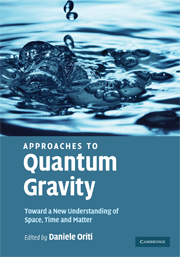Book contents
- Frontmatter
- Contents
- List of contributors
- Preface
- Part I Fundamental ideas and general formalisms
- Part II String/M-theory
- Part III Loop quantum gravity and spin foam models
- Part IV Discrete Quantum Gravity
- Part V Effective models and Quantum Gravity phenomenology
- 22 Quantum Gravity phenomenology
- 23 Quantum Gravity and precision tests
- 24 Algebraic approach to Quantum Gravity II: noncommutative spacetime
- 25 Doubly special relativity
- 26 From quantum reference frames to deformed special relativity
- 27 Lorentz invariance violation and its role in Quantum Gravity phenomenology
- 28 Generic predictions of quantum theories of gravity
- Questions and answers
- Index
22 - Quantum Gravity phenomenology
from Part V - Effective models and Quantum Gravity phenomenology
Published online by Cambridge University Press: 26 October 2009
- Frontmatter
- Contents
- List of contributors
- Preface
- Part I Fundamental ideas and general formalisms
- Part II String/M-theory
- Part III Loop quantum gravity and spin foam models
- Part IV Discrete Quantum Gravity
- Part V Effective models and Quantum Gravity phenomenology
- 22 Quantum Gravity phenomenology
- 23 Quantum Gravity and precision tests
- 24 Algebraic approach to Quantum Gravity II: noncommutative spacetime
- 25 Doubly special relativity
- 26 From quantum reference frames to deformed special relativity
- 27 Lorentz invariance violation and its role in Quantum Gravity phenomenology
- 28 Generic predictions of quantum theories of gravity
- Questions and answers
- Index
Summary
The “Quantum Gravity problem”, as seen by a phenomenologist
The “Quantum Gravity problem” has been discussed for more than 70 years assuming that no guidance could be obtained from experiments. But of course if there is to be a science of the Quantum Gravity problem it must be treated just like any other scientific problem, seeking desperately the guidance of experimental facts, and letting those facts take the lead in the development of new concepts. We must hope this works also for the Quantum Gravity problem, or else abandon it to the appetites of philosophers.
Unfortunately it is not unlikely that experiments might never give us any clear lead toward Quantum Gravity, especially if our intuition concerning the role of the tiny Planck length (~ 10−35 m) in setting the magnitude of the characteristic effects of the new theory turns out to be correct. But even if the new effects were really so small we could still try to uncover experimentally some manifestations of Quantum Gravity. This is hard, and there is no guarantee of success, but we must try.
Our estimate that the Quantum Gravity corrections should be very small in low-energy experiments is based on our experience with other similar situations; in fact, we expect that the Planck scale, since it is the energy scale where the current theories appear to break down, should also govern the magnitude of Quantum Gravity corrections to the analysis of processes involving particles with energies smaller than the Planck scale.
- Type
- Chapter
- Information
- Approaches to Quantum GravityToward a New Understanding of Space, Time and Matter, pp. 427 - 449Publisher: Cambridge University PressPrint publication year: 2009
- 5
- Cited by



